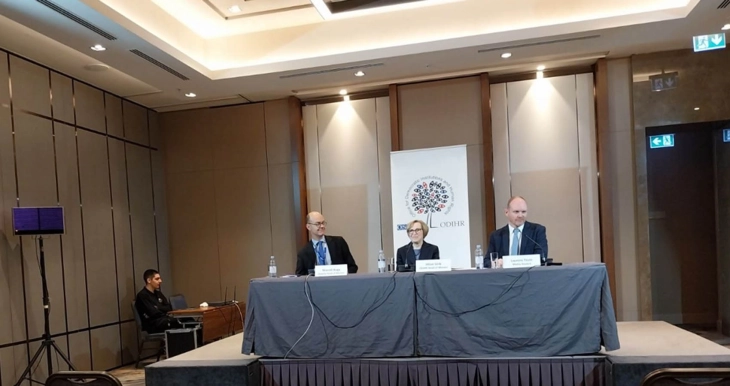OSCE/ODIHR opens elections observation mission ahead of double elections
- The OSCE Office for Democratic Institutions and Human Rights (ODIHR) opened Thursday an election observation mission to North Macedonia for the April 24 presidential elections and the May 8 parliamentary elections, following an invitation from the national authorities.
- Post By Angel Dimoski
- 13:15, 21 March, 2024

Skopje, 21 March 2024 (MIA) – The OSCE Office for Democratic Institutions and Human Rights (ODIHR) opened Thursday an election observation mission to North Macedonia for the April 24 presidential elections and the May 8 parliamentary elections, following an invitation from the national authorities. The mission will deploy 300 short-term and 20 long-term observers throughout the country.
The head of the observation mission, Ambassador Jillian Stirk, said these are the 22nd elections in North Macedonia that will be observed by ODIHR. The last elections they observed were the local elections in 2021.
“ODIHR works in line with the established election observation methodology. We are completely unbiased and founded on facts. Within the framework of the mission, an assessment will be carried out whether the elections are in line with the OSCE commitments and other international obligations, as well as the national legislation. We have a main team of 12 international experts in Skopje from 12 OSCE states. This is a very diverse group. We will be in the country both for the presidential and parliamentary elections and leave on May 19,” Ambassador Stirk said.
In addition to the main team, ODIHR will deploy 20 long-term observers throughout the country, with teams of two in Tetovo, Ohrid, Bitola, Prilep, Strumica, Kochani, Kumanovo and Shtip, as well as two teams in Skopje.
“We have also requested an additional 300 short-term observers expected to arrive shortly before the elections. They will go to the polling stations, observe the voting, the counting of ballots and the tabulation of results. They will arrive shortly before the elections,” the head of the observation mission said.
Stirk said the team of experts will work on issues related to the election administration, the legislative framework, political environment, campaign, political financing, media and campaign financing. As of next week, the observation mission will begin a comprehensive monitoring of the media, she said.
“We will also communicate with all institutions that are involved in the electoral process, as well as the political parties and civil society. On the basis of all those talks, we will draft a preliminary report which should be published on April 9,” the Ambassador said.
She clarified that the format of the mission is based on the recommendations of ODIHR’s needs assessment mission following their visit in January 2024.
“For the first time in North Macedonia, we will observe two types of elections happening at the same time – presidential and parliamentary elections. We will analyze the two processes separately, but we will combine the findings when they are relevant to both elections,” Stirk said.
The OSCE/ODIHR mission will be joined by delegations from the Parliamentary Assembly of the Council of Europe (PACE) and the European Parliament on both election days, and a delegation from the OSCE Parliamentary Assembly (OSCE PA) for the parliamentary elections.
“We will work together with our partners and we will give a joint statement immediately after each election day, i.e., on April 25 and May 9. We will have an interim report two weeks ahead of election day, a statement of preliminary findings will be presented at press conferences on the day after each elections and a final report that will be published two months after the election process,” the Ambassador stressed.
In answer to a journalist’s question if the institutions will have enough time to prepare considering the OSCE/ODIHR recommendations in terms of amendments to the Electoral Code were adopted only two weeks ago, the head of the observation mission said they are still carrying out an assessment.
“We had an initial meeting with the State Election Commission, but this is our first day of work as an observation mission so we are beginning with these assessments. We are aware of the work and the previous recommendations, but we still haven’t carried out a complete assessment. We are still in a stage where we are analyzing the situation, but of course, this is one of the things that will be analyzed within our observation mission – whether the previous recommendations have been taken into account,” Ambassador Stirk noted.
On whether the number of observers has increased, Stirk stressed that the number of observers is founded on the recommendations of the needs assessment mission.
“There are two types of elections that are being held on the same day, so it’s not unusual to have a larger number of observers, and we are requesting a large number of observers for both elections. As I said, this is based on the recommendations of the needs assessment mission,” Ambassador Stirk said.
Photo: MIA







